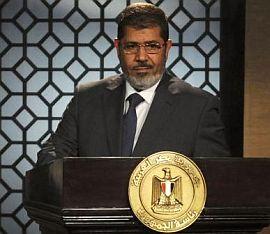 | « Back to article | Print this article |
 In the course of talks with Egyptian president Mohamed Morsi, who will be in India on March 18, the tricky one for New Delhi to handle may well be Cairo’s quest for greater co ordination on Syria. Saeed Naqvi examines
In the course of talks with Egyptian president Mohamed Morsi, who will be in India on March 18, the tricky one for New Delhi to handle may well be Cairo’s quest for greater co ordination on Syria. Saeed Naqvi examines
These are not cheerful times for South Block in its dealings with neighbours or nations as distant as Italy. But there is a whole range of countries, in the Arab world which have traditionally been warm to New Delhi and who have been sending senior envoys to plead their respective cases and seek Indian support bilaterally and in multilateral forums.
In this sequence, a visit of considerable importance is by Egypt’s president, Mohamed Morsi on March 18.
It would be churlish even to register negatively the fact that he will also visit Pakistan. He is a duly elected leader of his country after the so called Arab Spring ushered in some dramatic changes. These have since been successfully resisted by the Kingdoms and the Sheikhdoms in the region.
There are two broad problems Morsi has to contend with as he navigates his nation through a turbulent transition. First Egyptian culture and civilization are in conflict with Egyptian politics. The circumscribed “Muslim Brotherhood” format does not sit easy on its secular character.
The other problem is that the country’s electoral democracy is not yet on constitutional tracks which have been validated by the courts. This is why Parliamentary elections which were to be held in April 22 have been postponed.
In the course of talks with Morsi, the tricky one for New Delhi to handle may well be Cairo’s quest for greater co ordination on Syria. There will be a distinct Arab nuance to Cairo’s stand on that issue.
Recently the Arab League meeting at its headquarters in Cairo decided to give the Syrian chair at the League to the Syrian opposition. That Lebanon always abstains on any vote taken on Syria, reflects the Lebanese reality: the nation is divided on the issue.
Cairo’s position on Syria is that President Bashar al Assad appoint someone who can lead the negotiations with the opposition.
The question, ofcourse is, which opposition? According to UN Envoy, Lakhdar Brahimi there are 148 small and large groups fighting the central authority inside Syria. Is there even a ghost of a chance of a coherent opposition emerging from this motley crowd?
New Delhi wants Syria’s territorial integrity preserved and a negotiated end to the unspeakable violence visited upon the country.
One consideration comes into play in both, New Delhi and Cairo’s relations with Teheran. Neither would like to impair their relations with the GCC countries which, needless to say, stand to lose greatly should hostilities break out in the region – by accident or design.
Just as Syria will figure in Morsi’s talks, so was it at the top of the agenda with the speaker of the Iranian Majlis, and the Foreign Secretary of Turkey.
There is little doubt that a great deal of Syria’s current tragedy has been heaped upon it by massive external support to internal discontent.
Turkey’s problems are potentially severe too. These will become clear as time passes by.
The country was cruising along smoothly with an economy so much stouter than its European neighbours that the urge to enter Europe had given way to a national self confidence, sans Europe. Ironically, it had gained enormously by following on all the conditions preparatory to its entry into Europe. Towards that end, its democracy, ecology, economy, human rights, relations with neighbours had all improved.
At the time that Europe was in painful economic decline, Turkey looked by comparison, an extremely attractive place. Even the de facto autonomy of the Kurdish north of Iraq was open turf for Turkish business involved in mega projects.
A “simulated” distancing from Israel had given it some leeway in the Arab street. Relations with Iran were so good as to be potentially useful as a line of communication with the US.
True, a destabilized Syria would be a matter of grave concern to Turkey. The countries share a long border. What makes little political sense is the mounting evidence that Turkey allowed itself to be the earliest conduit for arms and men to the Aleppo and areas around it.
Apparently, Tayyip Erdogan could not resist the temptation of revealing himself as a ranking Muslim Brotherhood leader who had only toned down his Islamic credentials to fool Turkey’s urban elite and the Army, reared in a culture of uncompromising secularism, not dissimilar to what obtained in Damascus before the current crisis was loosened upon it.
This was stressed in the letter from President Assad carried by his senior adviser Bouthaina Shaaban for Prime Minister Manmohan Singh. President Assad has also requested the Prime Minister to lead an initiative by BRICS for peace in Syria.